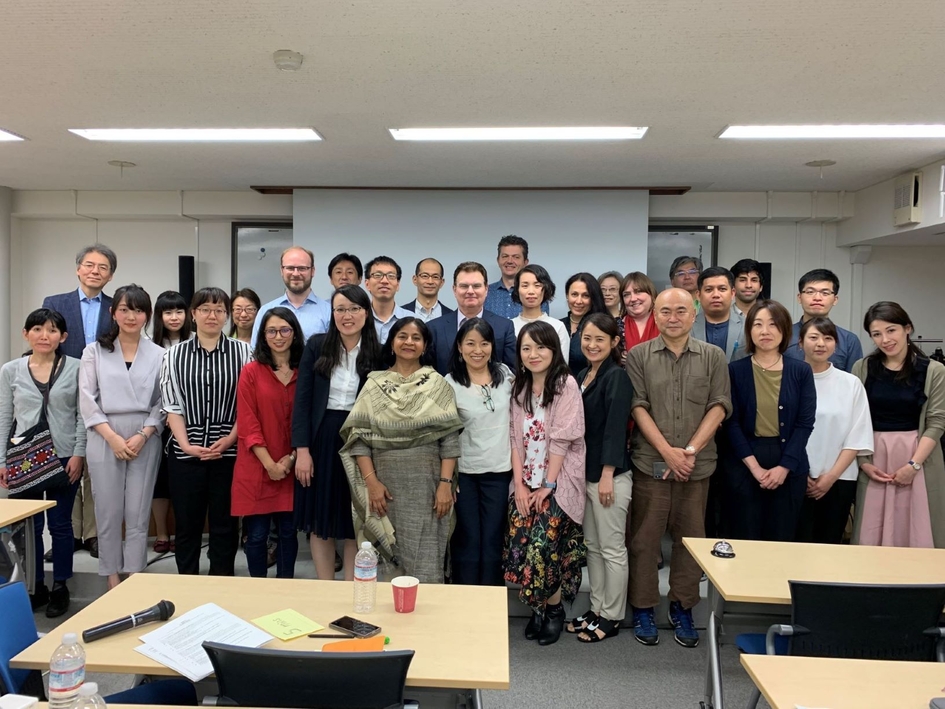News
東文研・ASNET共催シンポジウム「伊藤国際学術研究センター会議/Ito International Research Centre Symposium『Crossing Boundaries: Migration, Mediation, Morality』」が開催されました
報告
2019年6月8日から三日間、東京大学伊藤国際ホールと東洋文化研究所にて、国際シンポジウムCrossing Boundaries: Migration, Mediation, Moralityを開催しました。移民や難民の問題から、さまざまな事情で国境や境界を越えた人々、あるいは、移動に伴う環境への適合など、幅広い視点から、人の移動について考えました。
当日の様子
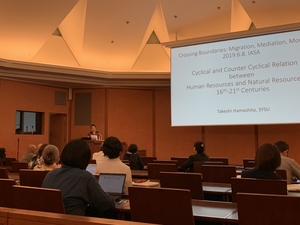 | 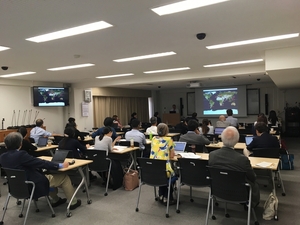 |
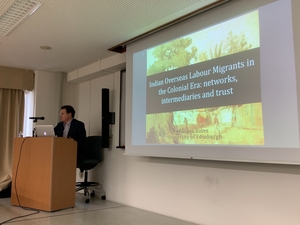 | 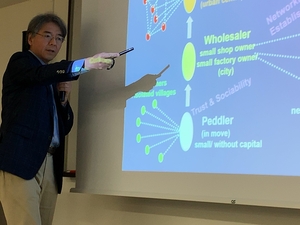 |
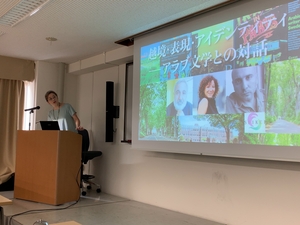 | 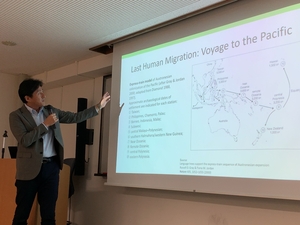 |
3日間、議論は大いに盛り上がりました。参加した皆さんに報告文を寄せていただきました。
【報告 1】
2019年6月8日(土)から10日(月)の3日間、国際シンポジウム「Crossing Boundaries :Migration, Mediation, Morality」が開催された。
濱下武志先生による基調講演からスタートした本シンポジウムは、様々な分野の研究者による報告がなされ、まさにCrossing Boundariesという名の通り、領域横断的に人の移動について考える機会となった。ここでは、主にシンポジウムの運営に関わった視点から、敢えて個別の議論には寄らずに述べていく。
現代世界における「人の移動」という現象をどう捉えるのか。本シンポジウムが各セッションにおいて個別テーマを設けているように、それは個々の事象に引き付けて考える必要があり、だが同時に、一義的に社会経済的要因や政治的要因によって捉えきれるものではない。そういった複雑性を抱える中で、本シンポジウムの構成それ自体が体現している学際的アプローチは、異なる分野を繋げるということ以上に、そうしたアプローチの全体像を提示したという点において、非常に有意義であったと考える。
また、そうした学術的な研究をいかに日常性と結びつけるかという問題に際しては、今日的状況を複雑性という特徴に求めることによって、かえって問題の固定化を招いてしまうという逆説が生じている。学際的アプローチにおいて異なる学科性をどのように把握し、どう位置づけるのかが問われる中、前提としてあった体系そのものを捉えなおすことにその内実があるのではないか。今回のシンポジウムを一つのまとまりとして捉えたときに、そのように感じられた。
シンポジウムのClosing Remarksにおいて石田貴文先生が挙げておられた、レヴィ=ストロースの言が興味深いものとして印象に残っている。その「we can not look without prejudice, but we do with prejudice」という言葉は、人の移動とともに変化が常態化し、自己統一性を何に求めるかが常に問われる今日の世界と対峙するうえで、まさに要請されるものではないだろうか。
(報告執筆:東京大学学際情報学府・情報学環修士課程修了 濱中麻梨菜)
【報告 2】
This symposium provided a truly interdisciplinary perspective on the now highly pertinent topic of international migration. By bringing together leading scholars from fields of anthropology, sociology and the physical sciences, the three-day event allowed participants to cross not only the boundaries of nations and ethnicities, but also disciplines and different angles of looking at the same phenomenon.
Despite the disparate disciplines of its presenters, the symposium accentuated the thematic keyword of “identity” of various peoples, both at the group and individual levels, and asked the audience to question existing identities that are currently taken as granted and matter-of-fact. In one way, the questioning is done by zooming in on little-known minorities (such as Prof. Mirzai’s African-Iranians, Prof. Kuroki’s Lebanese-Brazilians and Prof. Fletcher’s Englishmen in colonial Shanghai). In another way, it occurs when the definitions of commonly accepted terms are problematized (such as Prof. Bates’s “slaves,” Prof. Goto’s “heretic” and Prof. Oka’s “homeland”). By providing nuanced and complex answers to the question of “who are we,” the presenters put forth brand new notions of social belonging that is worthy of continued developments in future studies.
This symposium was particularly innovative in bringing together a group of presenters from the physical sciences, who provided a much longer view of human migration, beyond the confines of race, nation and social groups so central to social scientific research. Prof. Maat, Nakayama and Ota all managed to detect genetic changes in biological organisms (including humans themselves) that suggest how cultural changes, compounded by different environmental conditions in different geographies, concretely shaped how humans live and die. The impact of human migration, as studies of genetics and the environment tells us, changed much more than just the identity of the humans themselves but also many other living creatures. Migration, thus, allows boundaries to be crossed between social and physical sciences in ways that few other topics could so clearly.
The resulting discussions from the presentations are undoubtedly a source of great inspirations for younger scholars and the general audience. At a personal level, my own research, already interdisciplinary in nature, benefits from further extending into many other disciplines via the frameworks proposed by the symposium’s many presenters. The ability to think flexibly across theories, concepts and indeed, a limited part of the world, is a key takeaway that I would like to implement in my own conceptualization of what is a good piece of research in the field of migration studies.
(Written by Mr. Xiaochen Su, Ph.D. Student, Graduate School of Interdisciplinary Information Studies, The University of Tokyo)
【報告 3】
本シンポジウムでは、社会科学のみならず歴史学や教育学、そして文学といった多様な分野の研究者が国内外から集まり、包括的に共通するテーマをめぐって議論がなされた。
国際シンポジウムに初参加であった私は、不安と期待が綯い交ぜになった気持ちで臨んだが、非常に実りある経験を積むことができた。普段はイランの文学研究をしており、社会科学等の異分野の話を聞く機会は稀であるため、このような機会を得られたことは自らの知見を深め、興味の幅を広げることへ繋がった。特に、奴隷制度や紛争による人の移動、亡命、そして移民や難民といった問題は、幸か不幸か、これまで世界中で文学が生まれる契機ともなっている。自分の分野にひきつけるならば、そうした経験をした人々の苦難や葛藤といった心性を理解するのが文学でもあるといえよう。本シンポジウムでは、自身の研究で重きを置く心性ではなく、その心性に至る環境や過程に、より光が当てられていた。主題へのアプローチ方法が異なっているため、新鮮かつ瞠目する内容が満載であった。
とりわけ、同地域のイランをフィールドとするベフナーズ・ミールザーイー教授の、イランへのアフリカ人奴隷についての講演や、森本一夫教授のムハンマドの系譜に関する講演では、自身のフィールドについて最先端の見聞を広めることが出来た。また、スィーマ・アラヴィー教授の、統治時代のインド人ムスリムについての講演では、知識人らが印刷技術を用いた上で、イスラーム圏各地で出版を行っていた点で近代イランの出版状況と共通点があることが明らかになった点が非常に興味深かった。
今回は講演を聴くだけではなく、発表の機会も頂いた。時間の都合上、深い議論は出来なかったが、この貴重な経験は間違いなく成長の糧となるはずである。改めて、機会を与えてくださったことに深謝申し上げる。また、シンポジウムの時間以外の懇親会や昼食の時間等も、様々な人と交流することができ、講演の詳細に関する質問や議論、それぞれの研究内容に関する話題で盛り上がった。気軽な空気で議論を交わせるのもまた、貴重な時間となった。
(報告執筆:大阪大学大学院言語文化研究科言語社会専攻博士後期課程1年 木下実紀)
【報告 4】
「Crossing Boundaries: Migration, Mediation, Morality」は、アジア研究の拠点の一つでもある東京大学東洋文化研究所とASNETの主催で、開かれた。発表された研究はどれも興味深く、また、学際的かつ様々な国、地域、大学からの参加者による報告と議論の様子は、まさに本シンポジウムが掲げたテーマを表象していた。
本報告者は、シンポジウム二日目の午後に設けられた学生セッションに参加した。日本社会における移民の子どもの教育や保育について研究関心のある報告者であるが、普段は、教育学領域において研究を共有することが多かった。そこで、「移民」さらには「境界線を越える」ことそれ自体から、自らの研究を俯瞰してみる機会になると考え、本シンポジウムへの参加を決めた。そうした背景を踏まえると、ほかの研究者の発表のそれぞれからも、自らが発表することからも多くを学んだ。
具体的には、移動する人を何によって定義するかについての議論は、今後も私自身が考えていかなければならない議題として再認識させられた。例えば、研究の中で「〇〇人」というときの定義は、分野によっても、そして研究の枠組みによっても異なる。社会的に構築される境界線の権力性を認識した上で、ゲノム研究等の自然科学の知見を生成することについての態度の取り方や、議論それ自体の丁寧な態度をディスカッションから学んだ。報告者の研究テーマである子育てや教育の議論でも中心的議題となる「文化」についても、研究をする上でどのような態度をとるか、その多様性を改めて確認できる機会となった。
最後に、このような国際シンポジウムで発表する機会は学生にとって重要な経験になることを記しておく。繰り返しになるが、シンポジウム中に報告された重要な研究者による研究発表を聴衆することでもすでに多くの重要な学びをさせてもらったが、学生として、自ら発表し、コメントを受けるプロセスからも重要なことを学ばせてもらった。さらには、セッションの始めにその場で共有された、「若手研究者(学生)による最新の研究を私たちが学ぶ機会なのである」という研究者の態度にインスパイアされた。このような貴重な機会に発表させてもらったことに感謝するとともに、今後の研究に励みたいと思う。
(報告執筆:東京大学教育学研究科博士課程 長江侑紀)
【報告 5】
筆者は報告者としての参加ではなく、事務局裏方のさらに補助役というごく局地的な形での関与であったが、今回のシンポジウムは「Crossing Boundaries: Migration, Mediation, Morality」という共通テーマを軸として、人の移動に関する多様な分野の研究成果に触れることができる新鮮で貴重な機会であった。
だが個人的に、今回のプログラムで最も深い印象を受けたのはDipesh Kharel監督によるドキュメンタリー映画「Playing with Nan」(2012年制作)だった。ドラマチックな画面や音楽を多用するのでなく、取材対象の人々の真率な思いを少しずつ引き出すことで、経済的事情により肉親と引き裂かれたことの悲しみ、空間的隔たりによって夫婦間の心情的な齟齬が広がってゆく苦しみなど、出稼ぎ労働というCrossing Boundariesがある一家にもたらした変化を浮かび上がらせ、一家庭の内側でありながらも普遍性のある情景として我々観客に提示するものであった。主人公であるネパール人男性を低賃金・長時間労働という過酷な条件で雇用しているのは同国出身者であるとはいえ、同作品は、外国人労働者をめぐる環境の劣悪さが日本国内で許容されている現状もまた静かに描き出している。会場において観客の多くを占めていたであろう日本人、および日本と同様に「(本国に留まるのに比べればまし、という理由で劣悪な条件にも甘んじる)安い労働力」を海外から受け入れている欧米の人々にとっては、貧困国の地位に置かれた国の人々が選択の余地なきCrossing Boundariesを強いられている国際社会の構造を、ミクロな事例を通じて突き付けられたと感じるものだったのではないか。
今回のシンポジウムのように極めて今日的なテーマを掲げる場合、来場者の多くが期待するのも、現代世界の諸状況が作り上げられてきた歴史的背景の解明、そしていま我々が生きる社会で進行している諸問題をめぐる展望ではないかと思われる。情緒的な訴求力のあるコンテンツが常に最良というわけではないが、移民・難民は身を寄せた先の社会で最も困難な立場に置かれやすい人々だからこそ、意識的・無意識的に彼らを搾取したり排除したりしているマジョリティ側の視野を広げさせ問題意識を喚起することは重要であり、その意味でも「Playing with Nan」のような映像作品の力の大きさを感じた。
一方で、研究報告には、ある事象に関する当事者の主観を分析したり客観的な数値を提供したりといった役割があり、今回のシンポジウムのような開かれた場でその成果が広く共有されることもまた極めて重要である。研究機関や学会が、学術性を担保しつつ現実の問題を照射し改善につながるための模索にどこまで踏み込んでゆけるか。そういったことを考えさせられたシンポジウムであった。
(報告執筆:東京大学東洋文化研究所/ASNET助教 板橋暁子)
開催情報
2019年6月8日(土)から10日(月)までの三日間、東京大学伊藤国際ホール(1日目午前)と東洋文化研究所(1日目午後以降)にて、人の移動に関 する国際シンポジウムを開催します。移民や難民の問題から、さまざまな事情で国境や境界を越えた人々、あるいは、移動に伴う環境への適合など 、幅広い視野から考えていきます。
事前登録不要です。関心のある多くの皆様のご参加をお待ちしております。
開催日: 2019年6月8日(土)~6月10日(月)
場所: 東京大学本郷キャンパス 伊藤国 際学術研究センター・ホール(6月8日午前)
東京大学本郷キャンパス 東洋文化研究所3階大 会議室(6月8日午後~9日および10日)
要旨:The International symposium 'Crossing Boundaries' will bring together scholars from many disciplines (history, literature, social and natural anthropology, sociology, political sciences, religious studies, geography, environmental studies, and engineering) to discuss multifaceted aspects of migration.
Contemporary world is faced with an acute crisis of migration. The fact that millions of people are forced to leave their homes in the Middle East and Africa illustrate the failures of the nation state system that characterized the universal mode of human political organization since WWI. With the dissolution of colonial empires, both political leaders and intellectuals hoped sovereign nation states will give rights to every individual and protect their dignity and equality. Yet, international community’s inability to confront and solve ethical, political, and material consequences of the migrants’ movement reveals the deeper political and intellectual defects of the global order of the post-WWII period. Migration as a political, cultural and social phenomenon challenges common ideas of citizenship and morality as many of the nation states fail to give migrants rights, while those societies trying to accommodate waves of migration are witnessing high levels of popular racist backlash among their citizens.
Although scholars, journalist and general public recognize the insufficiency of the nation state system’s ideal response to the migration crisis, we have yet to understand all aspects of this crisis, and imagine a solution or an alternative political culture that can overcome these defects. More importantly, communities of social scientists and humanities scholars must cooperate to reflect on the historical roots and multifaceted aspects of this contemporary crisis to guide political leaders towards a more idealistic solution.
The symposium will re-examine the movement of people in the context of history, environment, culture and evolution, and critically engage with the current discourse on immigration. We will also connect on-going research projects with regional focus and beyond to encourage dialogue beyond disciplinary and regional boundaries.
プログラム
| 1日目/DAY 1 | 8th June, 2019 |
| 会場/Venue | Morning: Ito Hall, Ito International Research Center Session 1: Main Conference Room, Institute for Advance Studies on Asia |
| 9:30-10:00 Welcome Drink | |
| 10:00-10:10 Opening Remarks Prof Tomoko Masuya (Institute for Advanced Studies on Asia [IASA], Director) | |
| 10:10-10:20 Rationale of the Symposium Dr Aya Ikegame (Interfaculty Initiative in Information Studies & IASA, UTokyo) | |
| 10:20-12:00 Keynote Speech Prof Takeshi Hamashita (Sun Yat-sen University, China / The University of Tokyo) “Cyclic and Counter-Cyclic Relations between Human Resources and Natural Resources: 16th-21st Centuries” | |
| 12:00-13:30 Lunch Break | |
| 13:30-16:00 Session 1: Questioning ‘Unfree’ Labour In this session, historical developments of many forms of ‘slavery’ across the regions will be examined. We commonly consider ‘slavery’ as unfree, exploitative and immoral. The session presents complex and nuanced image of slaves across cultures and regions, and questions the genealogy of anti-slavery discourse. | |
| Dr Lucio de Souza (Tokyo University for Foreign Studies) “Japanese Slavery and Japanese Diaspora in the Early Modern Period” | |
| Prof Behnaz Mirzai (Brock University) “Iranian People of African Descent: Local Boundary and National Unity” | |
| (Coffee Break) | |
| Prof Andrea Major (the University of Leeds, UK) “After Slavery: Debating Global Labour Migration, 1838-42” | |
| Dr Aya Ikegame (The University of Tokyo) “Devotion and Slavery: Submissive Agency and Development in Modern India” | |
| | 16:15-18:15 Screening of a Documentary Film 'Playing with Nan' (2012) Conversation with the Director Dr Dipesh Kharel |
| | 18:30-20:30 Reception |
| 2日目/DAY 2 | 9th June 2019 |
| 会場/Venue | Main Conference Room, Institute for Advance Studies on Asia |
| 9:30-10:00 Welcome Drink | |
| 10:00-12:30 Session 2: Imagining of Home and Beyond In our increasingly ‘multicultural’ world, people are imagining and reconstituting what they think is the culture of the ‘home’. For migrants, this social construction of ‘culture’ engages both positively and negatively with the host culture. Their imagination of ‘home’ can also indicate a possible future of home that is otherwise unimaginable in their places of origin. | |
| Prof Seema Alavi (University of Delhi) “Indian Muslims in the Age of Empire” | |
| Dr Robert Fletcher (The University of Warwick) “Remittance, Remorse and Filial Duty: Home in the Correspondence of Charles Lenox Richardson (1833-62), Shanghai Merchant” | |
| (Coffee Break) | |
| Dr Emi Goto (ASNET/ IASA, the University of Tokyo) “Fighting Over Homes: A Story of ‘Heretic’ in the 20th Century Egypt” | |
| Prof Mari Oka (Kyoto University) “Deterritorializing the “Watan”:Variety of Homeland Image and Lived Experiences of Exiles” | |
| 12:30-13:30 Lunch Break | |
| 13:30-16:15 Session 3: Connected and Affected Migration has often been understood as combination of the movements of individuals ‘pulled’ by wages offered and ‘pushed’ by social and economic conditions in the place of origin. In this movement, the individual choses ‘rationally’ where she/he would go. In this session, we take collectivity more seriously by arguing that people move because of networks, affective relations and hopes for change that were not necessarily ‘rational’. | |
| Prof Kazuo Morimoto (IASA, UTokyo) “Why Are the Descendants of the Prophet Muhammad So Widely Distributed?” | |
| Prof Crispin Bates (the University of Edinburgh) “North Indian Overseas Labour Migrants in the Colonial Era: Networks, Intermediaries and Trust” | |
| (Coffee Break) | |
| Prof Hidemitsu Kuroki (Tokyo University of Foreign Studies) “Unwittingly globalized: Connectivity of Lebanese and Syrian Migrants During the Late 19th and Early 20th Centuries” | |
| Prof Shigeto Sonoda (IASA, UTokyo) “Sandwiched by China and Japan: Analyzing Perception toward the ‘Rise of China’ by Second Generation of Chinese Migrants in Japan ” | |
| Dr Tina Shrestha (Waseda University) "Aspirational Infrastructure: Everyday brokerage and the Foreign-Employment Recruitment Agencies in Nepal" | |
| 16:15-18:30 Student Workshop: We invite students to present short speeches (10-15 min) on the theme. | |
| Miki Kinoshita (Ph.D. Student, Osaka University) “Literary Translation in the Qajar Dynasty” Kaori Mizukami (Ph.D. Student, the University of Tokyo) “Indian Immigrants to North America and Their Ports of Call in the Early Twentieth Century” Jiwon Kim (Ph.D. Student, The University of Tokyo) “Repatriation of Keijo Imperial University Alumni and Reintegration into Elite Japanese Society: With a Focus on Bureaucrats and Academics” Xiaochen Su (Ph.D. Student, The University of Tokyo) “A Battle of Resources: Social Integration of and the Perception of Control over Chinese Residents in the Russian Far East” Yuki Nagae (Ph.D. Student,The University of Tokyo) “Parental Beliefs on Preschool-aged Children among Immigrant Families in Japan” | |
| 3日目/DAY 3 | 10th June 2019 |
| 会場/Venue | Main Conference Room, Institute for Advance Studies on Asia |
| 10:30-11:00 Welcome Drink | |
| 11:00-13:30 Session 4: Environmental Adaptation: The movement of people has brought about dramatic environmental change through the introduction of commercial and food crops. These have turned many tropical regions of the world into plantation colonies. Changes in the natural environment have also encouraged and forced people to move out of their homes. The session brings together historians, social and natural anthropologists, and geographers to engage critically with the relationship between migrant humans and the environment. | |
| Prof Harro Maat (Wageningen University, the Netherland) “Migrant Foodscapes in the Anglo-Dutch Caribbean: Slavery, Migrant Labour and Peasant Farming 1800-1950” | |
| Prof Takuro Furusawa (Kyoto University) “History of Human Evolution and Adaptation from Africa to Asia” | |
| (Coffee Break) | |
| Prof Kazuhiro Nakayama (School of Frontier Sciences, UTokyo) “Local Adaptation and Susceptibility to Lifestyle-related Diseases in East Asia” | |
| Prof Hiroki Ota (School of Science, UTokyo) “Adaptation to Cultural Environments Found in Human Genome Diversity” | |
| 13:30-14:30 Lunch Break | |
| 14:30-15:30 Session 5: Relational Approaches to Migration | |
| Prof. Eiji Nagasawa (Tokyo University of Foreign Studies & Islam-Gender Studies, Project Leader) “Beyond the Boundaries: Our Challenge with Islam-Gender Studies” | |
| Prof. Shigeto Sonoda (IASA, UTokyo) “Survey on Second Generation Chinese Migrants in Australia and Japan” | |
| Prof Crispin Bates (the University of Edinburgh) “Becoming ‘Coolies’: Re-thinking the origin of Indian Ocean Labour Migration in the Colonial Era” | |
| 15:30-16:00 Coffee Break | |
| 16:00-17:00 Round Table: Searching for a New Ethics Chairs and/or some of the presenters of the previous sessions will join. | |
| 17:00-17:15 General Comments & Closing Remarks Prof Takafumi Ishida (School of Science & ASNET, UTokyo) |
最新の情報はASNETのHPをご確認ください。 https://asnet- utokyo.jp/studies/event/5373
主催:東京大学(東洋文化研究所、日本・アジアに関する教育研究ネットワーク)
共催:南アジア地域研究東大拠点(TINDAS)
科研費 新学術領域研究 グローバル秩序の溶解と新しい危機を超えて ―関係性中心の融合型人文社会科学の確立(代表:千葉大 学・酒井啓子)
科研費 基盤研究(A) イスラーム・ジェンダー学の構築のための基礎的総合的研究(代表:東京外国語大学・長沢栄治)
問い合わせ先: crossingboundaries2019[at]gmail.com
担当:後藤
登録種別:研究活動記録
登録日時:MonJul810:25:492019
登録者 :asnet事務局・藤岡・田川
掲載期間:20190709 - 20190910
当日期間:20190608 - 20190610

